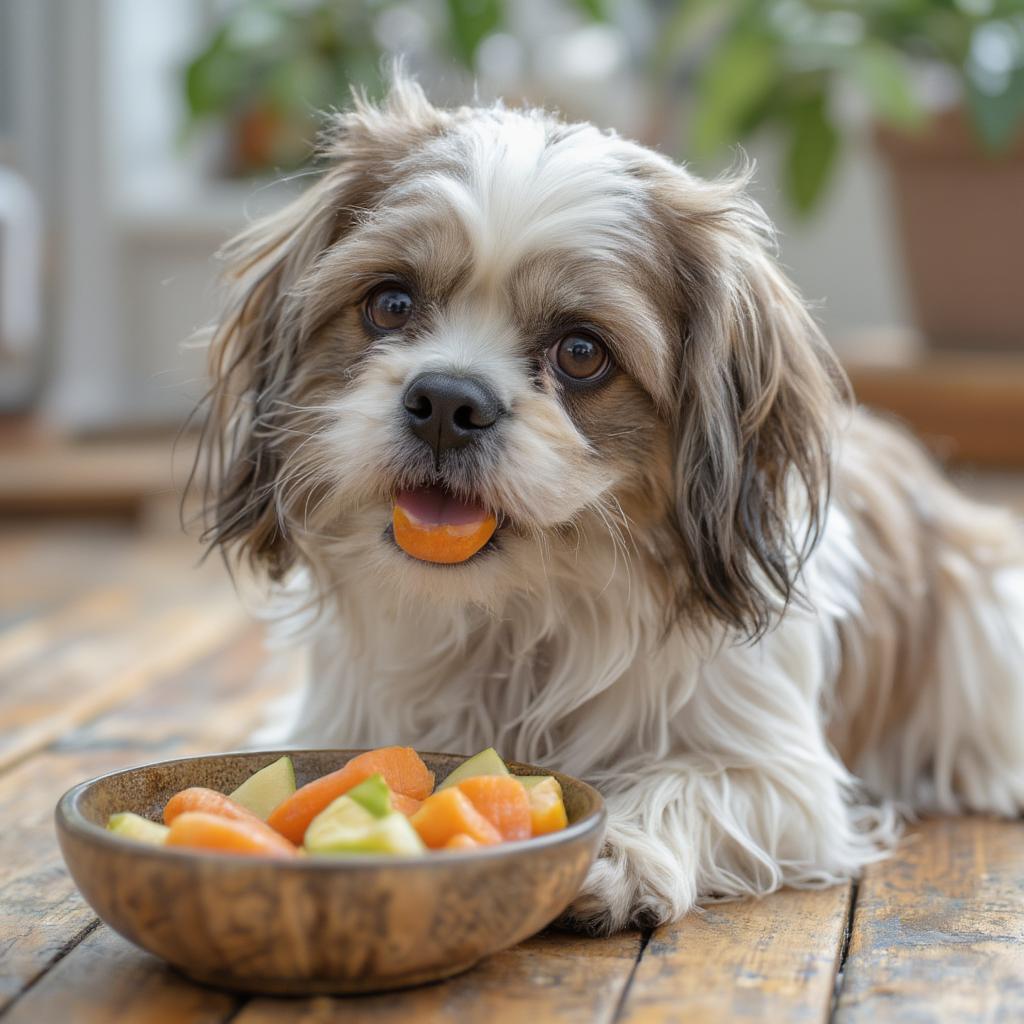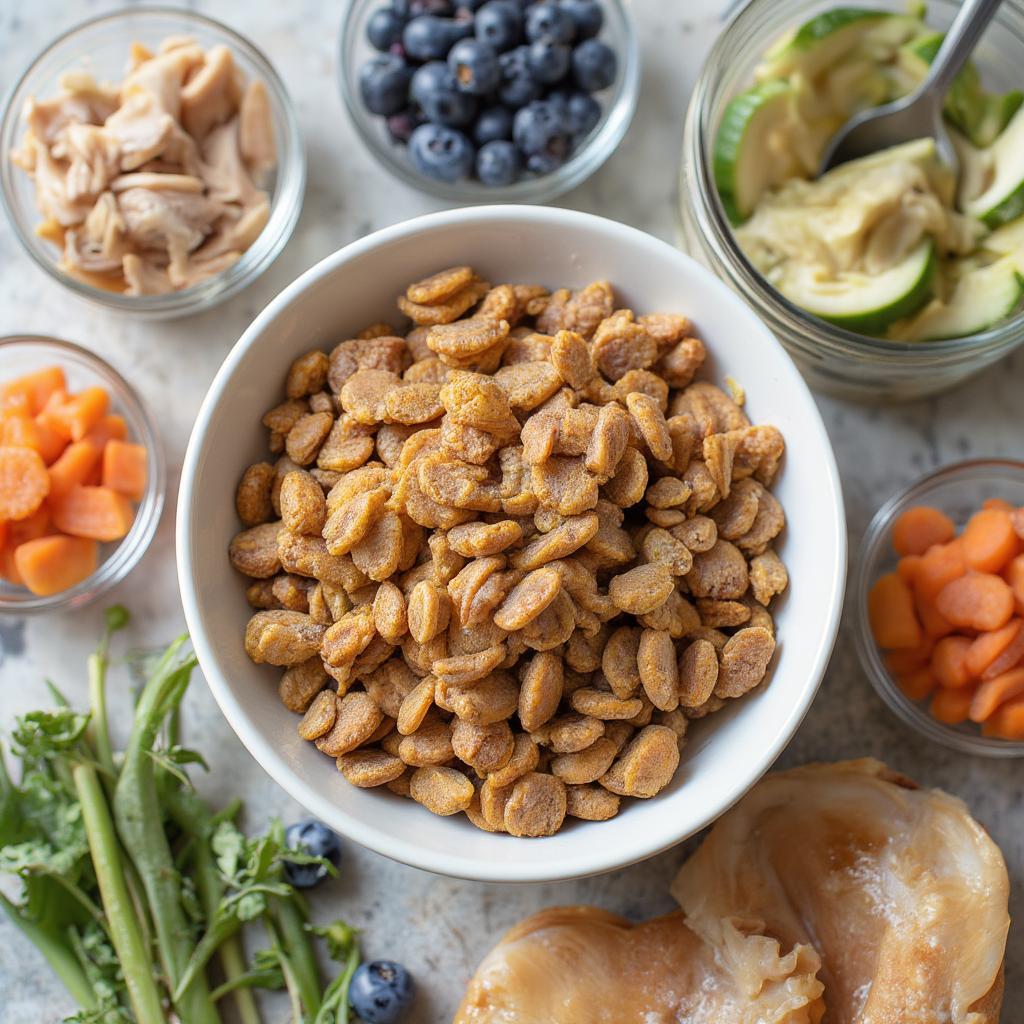Shih Tzus, with their adorable faces and playful personalities, are a popular breed. Ensuring they receive the right nutrition is crucial for their health and happiness. This comprehensive guide will explore what foods Shih Tzus can eat, covering essential nutrients, safe human foods, foods to avoid, and tips for creating a balanced diet. We’ll delve into the specifics of feeding your Shih Tzu, addressing common concerns and providing expert advice to help you make informed decisions about your furry friend’s meals.
Understanding Shih Tzu Nutritional Needs
Just like humans, Shih Tzus require a balanced diet consisting of proteins, fats, carbohydrates, vitamins, and minerals. Proteins are essential for muscle development and repair, while fats provide energy and support healthy skin and coat. Carbohydrates offer a readily available energy source, and vitamins and minerals are crucial for various bodily functions.
The Importance of High-Quality Protein
High-quality protein sources, such as chicken, turkey, lamb, fish, and eggs, should form the foundation of your Shih Tzu’s diet. These provide the essential amino acids needed for growth and maintenance. Look for dog foods that list a specific meat source, like “chicken” or “lamb,” as the first ingredient, rather than generic terms like “meat by-products.”
Essential Fatty Acids for a Healthy Coat
Shih Tzus are known for their long, flowing coats, which require adequate intake of essential fatty acids like omega-3 and omega-6. These fatty acids contribute to skin health, reduce inflammation, and promote a shiny, lustrous coat. Fish oil, flaxseed oil, and specific dog food formulas enriched with these fatty acids are excellent options.
Carbohydrates for Energy
While not as crucial as protein and fats, carbohydrates provide a quick source of energy for your Shih Tzu. Choose complex carbohydrates, such as brown rice, sweet potatoes, and oatmeal, over simple carbohydrates like white rice or corn syrup. These complex carbohydrates are digested more slowly, providing sustained energy and preventing blood sugar spikes.
Safe Human Foods for Shih Tzus
While commercially prepared dog food is recommended, certain human foods can be safely incorporated into your Shih Tzu’s diet as occasional treats or supplements.
Fruits and Vegetables Your Shih Tzu Will Love
Many fruits and vegetables are safe and even beneficial for Shih Tzus. Apples (without the core and seeds), bananas, blueberries, carrots, green beans, and pumpkin are all healthy options packed with vitamins and fiber. Remember to introduce new foods gradually and in small quantities to avoid digestive upset.
Lean Proteins and Healthy Grains
Cooked, boneless chicken, turkey, or fish (without bones) can be offered as occasional treats. Small amounts of plain cooked brown rice or quinoa can also be added to their meals. Always avoid seasonings, spices, and sauces, as these can be harmful to dogs.
 Shih Tzu enjoying healthy human food like carrots and apples.
Shih Tzu enjoying healthy human food like carrots and apples.
Foods to Avoid Feeding Your Shih Tzu
Certain foods are toxic to dogs and should never be given to your Shih Tzu.
Toxic Foods for Dogs
Chocolate, grapes, raisins, onions, garlic, macadamia nuts, and avocados are all highly toxic to dogs and can cause serious health problems, even death. Xylitol, an artificial sweetener found in many sugar-free products, is also extremely dangerous for dogs.
Foods That Can Cause Digestive Issues
While not necessarily toxic, some foods can cause digestive upset in Shih Tzus. These include dairy products (due to lactose intolerance), fatty or greasy foods, and foods high in sodium. Always err on the side of caution and avoid feeding your Shih Tzu anything you’re unsure about.
Creating a Balanced Diet for Your Shih Tzu
A balanced diet is crucial for your Shih Tzu’s overall health and well-being.
Choosing the Right Dog Food
When choosing commercial dog food, look for options specifically formulated for small breeds. Consider your Shih Tzu’s age, activity level, and any specific dietary needs or allergies when making your selection. Always consult with your veterinarian if you have concerns about your Shih Tzu’s diet.
Portion Control and Feeding Schedule
Avoid overfeeding your Shih Tzu, as obesity can lead to various health issues. Follow the feeding guidelines on the dog food packaging and adjust portions based on your dog’s individual needs. Establishing a regular feeding schedule helps regulate digestion and prevents begging.
 A balanced diet for a Shih Tzu includes high-quality dog food, fruits, and vegetables.
A balanced diet for a Shih Tzu includes high-quality dog food, fruits, and vegetables.
The Importance of Fresh Water
Always ensure your Shih Tzu has access to fresh, clean water. Dehydration can lead to serious health complications.
Expert Insights on Shih Tzu Nutrition
“Shih Tzus, like all dogs, thrive on a diet that meets their specific nutritional requirements,” says Dr. Emily Carter, a veterinary nutritionist with over 15 years of experience. “High-quality protein, healthy fats, and controlled portions are key to maintaining their health and preventing obesity.”
Dr. Carter also emphasizes the importance of regular veterinary checkups. “Regular checkups allow us to monitor your Shih Tzu’s weight, assess their overall health, and address any dietary concerns proactively.”
 A veterinarian examining a Shih Tzu during a routine checkup.
A veterinarian examining a Shih Tzu during a routine checkup.
Conclusion
Feeding your Shih Tzu a healthy and balanced diet is essential for their long-term health and happiness. By understanding their nutritional needs and avoiding harmful foods, you can ensure your beloved companion enjoys a long and fulfilling life. Remember to consult with your veterinarian for personalized dietary recommendations tailored to your Shih Tzu’s specific needs. Choosing the right foods for your Shih Tzu is a crucial part of responsible pet ownership.
FAQ
-
Can Shih Tzus eat raw meat? While some dog owners choose to feed raw diets, it’s generally recommended to feed commercially prepared dog food, as it’s formulated to meet all of a dog’s nutritional needs and is less likely to contain harmful bacteria.
-
How much should I feed my Shih Tzu puppy? Puppies require more frequent meals than adult dogs. Consult your veterinarian or the puppy food packaging for specific feeding guidelines.
-
What are the signs of food allergies in Shih Tzus? Common signs of food allergies include itching, skin rashes, gastrointestinal upset, and ear infections.
-
Can Shih Tzus be vegetarian or vegan? It’s not recommended to feed a Shih Tzu a vegetarian or vegan diet, as it can be difficult to meet their nutritional needs without animal-based protein sources.
-
My Shih Tzu is a picky eater. What can I do? Try different dog food flavors or textures, or add a small amount of warm water or low-sodium chicken broth to their food to make it more appealing.
-
Are table scraps okay for Shih Tzus? While some human foods are safe for Shih Tzus, it’s best to avoid table scraps, as they can be high in fat, salt, and other ingredients that are not good for dogs. Stick to specifically chosen healthy treats instead.
-
How often should I change my Shih Tzu’s food? If you need to change your Shih Tzu’s food, do it gradually over several days to avoid digestive upset. Mix the new food with the old food in increasing ratios until the transition is complete. Always consult with your vet before making significant dietary changes.
